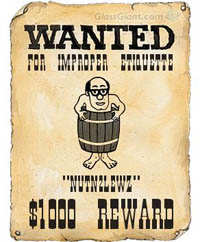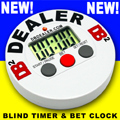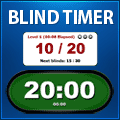Poker Etiquette
 In social situations, using proper etiquette gives you self-confidence, allows you to concentrate on more important matters,
and at times, allows you to dominate a situation against someone who does not use proper etiquette. Poker etiquette not only
makes for a better game, but is an acquired skill that can possibly increase a player's odds of success.
In social situations, using proper etiquette gives you self-confidence, allows you to concentrate on more important matters,
and at times, allows you to dominate a situation against someone who does not use proper etiquette. Poker etiquette not only
makes for a better game, but is an acquired skill that can possibly increase a player's odds of success.
Poker etiquette are not rules, but manners that relate to the orderly maintenance of the game and civility among
those who participate in the game. A player who repeatedly violates poker etiquette is a disruption to the game and should be
warned and disciplined if necessary however, as Tournament Director, use extreme caution when enforcing these "rules".
As the host (and Tournament Director) of a poker tournament, you will be faced with a dilemma - on the one hand you want an easy-
going and friendly poker game, but on the other hand, there is money involved and it is your responsibility to ensure a fair
and equitable game. The 'friendly neighbor' in you wants to ignore the occasional betting out of turn or 'string bet'. It's no big
deal when Jack stuffs his hole cards into his shirt pocket while he munches on his sandwich but the 'Tournament Director' in you
should not allow things like this to happen. Wait until Jack goes to a real casino for the first time and puts his hole
cards in his pocket! Make your rules clear right from the start. Put them in writing and announce a few of them before the tournament.
Most players will have no problems with your rules as long as they are informed of them beforehand.
Roberts Rules of Poker - Poker Etiquette
The following actions are improper, and grounds for warning, suspending, or barring a violator:
- Deliberately acting out of turn.
- Deliberately splashing chips into the pot.
- Agreeing to check a hand out when a third player is all-in.
- Reading a hand for another player at the showdown before it has been placed face up on the table.
- Telling anyone to turn a hand face up at the showdown.
- Revealing the contents of a live hand in a multihanded pot before the betting is complete.
- Needlessly stalling the action of a game.
- Deliberately discarding hands away from the muck. Cards should be released in a low line of
flight, at a moderate rate of speed (not at the dealer's hands or chip-rack).
- Stacking chips in a manner that interferes with dealing or viewing cards.
- Making statements or taking action that could unfairly influence the course of play, whether or not the
offender is involved in the pot.
- Using a cell phone at the table.
Roberts Rules of Poker - Conduct Code
Management will attempt to maintain a pleasant environment for all our customers and employees, but is not responsible for
the conduct of any player. We have established a code of conduct, and may deny the use of our cardroom to anyone who violates
it. The following is not permitted:
- Collusion with another player or any other form of cheating.
- Verbally or physically threatening any patron or employee.
- Using profanity or obscene language.
- Creating a disturbance by arguing, shouting, or making excessive noise.
- Throwing, tearing, bending, or crumpling cards.
- Destroying or defacing property.
- Using an illegal substance.
- Carrying a weapon.
HomePokerTourney
Rules of Poker Etiquette
Cordiality
- Be polite.
- Do not swear or be verbally abusive.
- Be modest when you win.
- Refrain from criticizing another player's play.
- Limit unnecessary chatter to avoid disturbing active players.
- Do not hit on another player, or the dealer, no matter how attractive you find them.
- Be kind to the dealer. Good karma brings good cards.
Table Presence
- Manage your table space reasonably.
- Keep your chips and/or money on the table.
- Do not handle another player's chips or cards.
- Do not stack chips in a way that interferes with the deal, the viewing of cards, or another player.
- Chips and/or money on the table are not to be transferred from one player to another.
- Protect your cards so that no one else can see them.
- Keep your cards on the table. Holding cards against your shirt or putting them in your pocket or lap is not allowed.
- It is proper for an opponent to complain when a player consistently has the opportunity to see another player's
hole cards. It is improper to complain when someone exercises this right.
- If you step away from the table, please advise the dealer of your intentions.
Play
- Play at a reasonable speed.
- It is each player's responsibility to follow the flow of the game. Play in turn. Do not act out of turn.
- At no time should any player or spectator make statements that could unfairly influence the play of a hand.
- Do not comment about the cards you just threw away.
- Refrain from making comments about possible hands. "The board just paired. Someone could have a full house now!".
Betting
- Do not splash the pot.
- Do not string bet.
- Verbally announce your action, particularly in games with non-professional dealers.
- Chips and discards should be placed as far forward as reasonably possible to make it easier for the dealer to handle them.
- When discarding your hand, do so towards the dealer at a low level of flight so that no other player can see what you have discarded.
- Do not expose any cards until the showdown.
The Showdown
- Do not mis-declare your hand.
- Show your winning hand quickly. Do not "slow-roll" (allow your opponent to think he's won when you know he hasn't).
- Rabbit hunting (asking to see what cards would have appeared, had you bet) should not be allowed.
Integrity
- Every player must play in their own self interest. Do not "soft play" any other player(s).
- Agreeing to "check-down" a hand after a player has gone All-in is not allowed.
- Coffee-housing (speaking during a hand for strategic purposes) is
allowed in North America but please exercise restraint.
- Asking to see called hands unnecessarily is bad manners, a waste of time, and is generally bad for the game.
Visit my House Rules page for more information.
|















 In social situations, using proper etiquette gives you self-confidence, allows you to concentrate on more important matters,
and at times, allows you to dominate a situation against someone who does not use proper etiquette. Poker etiquette not only
makes for a better game, but is an acquired skill that can possibly increase a player's odds of success.
In social situations, using proper etiquette gives you self-confidence, allows you to concentrate on more important matters,
and at times, allows you to dominate a situation against someone who does not use proper etiquette. Poker etiquette not only
makes for a better game, but is an acquired skill that can possibly increase a player's odds of success.







